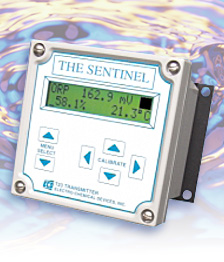Advanced Sensor Diagnostics Provide Predictive Maintenance Alert
With built-in pre-pHault technology, the Sentinel Analytical Sensor / Transmitter System warns plant and maintenance engineers that a sensor’s reference electrode is failing, not failed yet, but failing. This allows sensor replacement prior to a measurement failure that could lead to unexpected process or plant shut-downs.
Many analytical sensors in critical processes must operate 24-7 without interruption to assure product quality, protect equipment and provide a safe operating environment. For this reason, process and plant engineers who need to measure pH, ORP and pION have heretofore found themselves replacing analytical sensors on a pre-set maintenance schedule whether the sensors needed to be replaced or not to prevent unnecessary line or plant shutdowns.
With ECD’s advanced Sentinel Analytical Sensor / Transmitter System, pre-pHault sensor technology alerts maintenances crews with an alarm signaled by the transmitter via a programmable controller indicating the need for future sensor replacement. This eliminates the need for automatic, scheduled sensor replacement, reducing spare part and technician labor costs. The savings over the lifetime of an analytical instrument can be a significant one.
The Sentinel’s En-Guarde (EG) cartridges or ECD’s standard (EG) electrodes feature Radel or PEEK construction, horizontal and inverted operation, process-compatible front junction chemistries and more. They are also designed with velocity-friendly self-cleaning profiles and integral, redundant O-Rings and fail-safe (backed-Up) Quad-Rings. Polymerized electrolytes maintain electrical path integrity between batch cycles.
The Sentinel’s sensors measure pH from -0.5 to 14.5 pH under operating temperatures from -15 to +130°C, operation pressures from vacuum to 100 psig (standard) or 300 psig (custom). The ORP measurement range is -1000 to +1000 milliVolts at pressures of 300 psig and at temperatures up to 130°C. Specific ion (pION) sensing is available for 11 different chemicals: bromide, calcium, chloride, copper, cyanide, fluoride, iodide, potassium, silver, sodium and sulfide.



